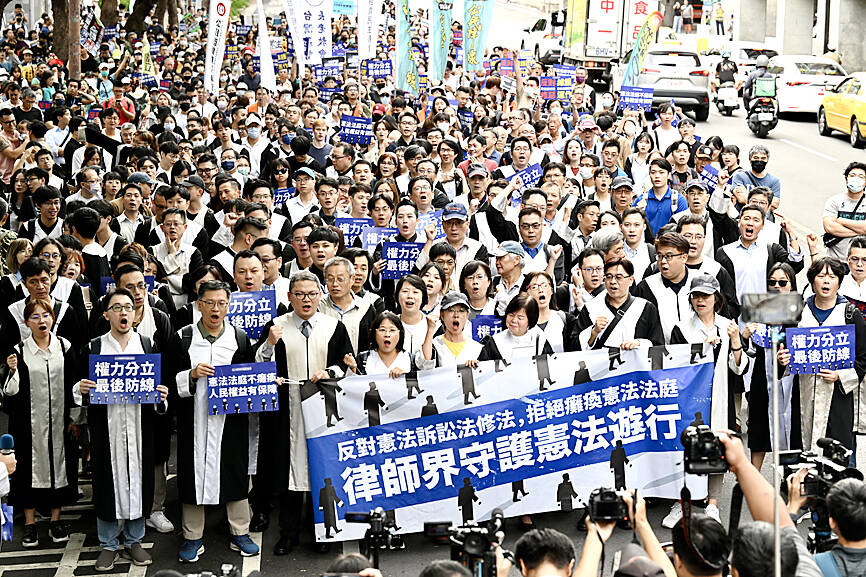More than 300 lawyers yesterday marched in Taipei to protest bills to amend the Constitutional Court Procedure Act (憲法訴訟法).
Under the bills proposed by Chinese Nationalist Party (KMT) Legislator Weng Hsiao-ling (翁曉玲), the Constitutional Court Procedure Act would be changed to specify that the total number of incumbent Constitutional Court justices is 15, while a two-thirds majority would be needed to issue a ruling.
Currently a simple majority is needed for the Constitutional Court to pass a judgement, but under the bills, 10 justices would need to agree in each case. If the legislature does not ratify judicial nominees, there would not be enough justices to oversee a case.

Photo: Lo Pei-de, Taipei Times
A group of 153 lawyers who organized the march said the bills would make it incredibly difficult for justices to rule on cases, which would cripple the court’s operations and restrict the public’s right to demand constitutional interpretations.
Cognito Law Office attorney Jacob Lin (林俊宏) said that more than 95 percent of the petitions for constitutional rulings concerned human rights cases.
Demonstrators urged the legislature to uphold democracy and the rule of law, while calling for heightened public awareness of the severity of the draft amendments and the importance of the Constitutional Court, Lin said.
The lawyers marched while wearing their judicial robes to show their determination to safeguard the constitutional system, he said.
Former justice Huang Hung-hsia (黃虹霞), who was appointed during the administration of former president Ma Ying-jeou (馬英九), also attended the march.
Huang said it would be “unconstitutional” if the bills passed, as they raise the threshold for passing a constitutional ruling and damage social justice.
The draft amendments would groundlessly redefine the total number of incumbent grand justices as stipulated in the Additional Articles of the Constitution of the Republic of China (中華民國憲法增修條文), marchers said.
If passed, the Constitutional Court would have to cease operations whenever there are an insufficient number of justices, they added.
The Constitutional Court is the last line of defense for the nation’s constitutional order and the ultimate judicial mechanism to ensure the protection of human rights and dignity, they said.
Additional reporting by CNA

The Ministry of the Interior (MOI) is to tighten rules for candidates running for public office, requiring them to declare that they do not hold a Chinese household registration or passport, and that they possess no other foreign citizenship. The requirement was set out in a draft amendment to the Enforcement Rules of the Public Officials Election and Recall Act (公職人員選舉罷免法 ) released by the ministry on Thursday. Under the proposal, candidates would need to make the declaration when submitting their registration forms, which would be published in the official election bulletin. The move follows the removal of several elected officials who were

The Republic of China (ROC) is celebrating its 114th Double Ten National Day today, featuring military parades and a variety of performances and speeches in front of the Presidential Office in Taipei. The Taiwan Taiko Association opened the celebrations with a 100-drummer performance, including young percussionists. As per tradition, an air force Mirage 2000 fighter jet flew over the Presidential Office as a part of the performance. The Honor Guards of the ROC and its marching band also heralded in a military parade. Students from Taichung's Shin Min High School then followed with a colorful performance using floral imagery to represent Taiwan's alternate name

FOUR DESIGNATED AREAS: Notices were issued for live-fire exercises in waters south and northwest of Penghu, northeast of Keelung and west of Kaohsiung, they said The military is planning three major annual exercises across the army, navy and air force this month, with the navy’s “Hai Chiang” (海強, “Sea Strong”) drills running from today through Thursday, the Ministry of National Defense said yesterday. The Hai Chiang exercise, which is to take place in waters surrounding Taiwan, would feature P-3C Orion maritime patrol aircraft and S-70C anti-submarine helicopters, the ministry said, adding that the drills aim to bolster the nation’s offshore defensive capabilities. China has intensified military and psychological pressure against Taiwan, repeatedly sending warplanes and vessels into areas near the nation’s air defense identification zone and across

A Chinese takeover of Taiwan would severely threaten the national security of the US, Japan, the Philippines and other nations, while global economic losses could reach US$10 trillion, National Security Council Deputy Secretary-General Lin Fei-fan (林飛帆) wrote in an article published yesterday in Foreign Affairs. “The future of Taiwan is not merely a regional concern; it is a test of whether the international order can withstand the pressure of authoritarian expansionism,” Lin wrote in the article titled “Taiwan’s Plan for Peace Through Strength — How Investments in Resilience Can Deter Beijing.” Chinese President Xi Jinping’s (習近平) intent to take Taiwan by force